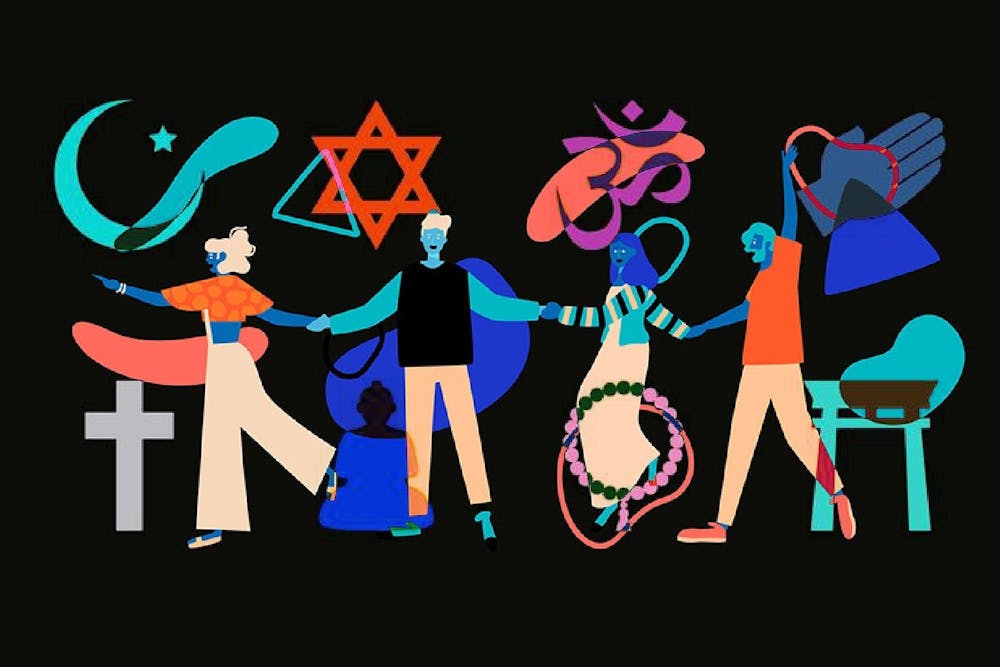Faith—it brings us together, pulls us apart, and spawns arguments both at the kitchen table and on the battlefield. In a world that’s progressively becoming more secular, organized religion often receives serious backlash for inciting prejudice and violence. Many religions are losing active participation—especially from younger generations who struggle to reconcile practicing religion with the polarization and acts of terror committed in the name of faith. It’s true that religious engagement has steadily been on the decline over the past century—and in our technologically advanced world that’s continually being updated, it’s no wonder the credences enshrined within thousand–year–old texts might not exactly 'relate' with kids of the Y2K.
During a season blossoming with faith–based celebrations, including Passover, Easter, Ramadan, and the Vernal Equinox, many families are experiencing the generational disconnect of their faiths. But what does this say about Gen Z’s spirituality? Although the world is shifting focus from long–established traditions to temporally centric activities, it would be simplistic to completely separate Gen Z from the faith of their predecessors. But in light of changing world views, Gen Z has adopted its own 'religious' practices to gain spiritual satisfaction.
For Millennials and members of Gen Z, astrology has increasingly been used as a faith–oriented outlet. Horoscopes are no longer occasional sources of entertainment found in the backs of magazines, but rather valued sources of insight and advice. According to the Pew Research Center, 29% of American adults “express beliefs” in astrology. It’s commonplace for Gen Z and Millennials to disclose each other’s signs before delving into the intricacies of birth charts and zodiac compatibility, argue over the validity of The DailyHoroscope, and note how Mercury being in retrograde is really messing with their sleep schedule.
Astrology, tarot cards, crystals, and energy healing are all components of New Age beliefs. The New Age movement of the '70s and '80s is a “metaphysical religious community” that uses elements of mysticism and self–transformation for spiritual fulfillment. The resurgence of New Age beliefs, including astrology, is largely due to mindfulness trends circulated on social media. Influencers, such as Goop founder Gwyneth Paltrow, further the cultural embedding of New Age spirituality—increasing generational interest in well–being, self–improvement, and mindfulness.
Meditation is another spiritual outlet rising in popularity in Western cultures. According to the Centers for Disease Control and Prevention, meditation—a 5000–year–old practice incorporated in Hinduism, Buddhism, and Judaism—has become the fastest–growing health trend in America. From burnt out students to professional athletes, millions turn to meditation to reduce anxiety and refocus their minds.
But beyond the increase in secularized mediation, many rely on the practice for spiritual fulfillment. Yoga—a practice that is derived from “ancient Indian philosophies”—often incorporates spiritually engaging activities, such as meditation. Interest in yoga has skyrocketed in the United States: The number of Americans participating in yoga increased by 50% between 2012 and 2016 alone. Though yoga is largely promoted for its health benefits, millions are attracted to the practice for its spiritual components. The 'zen yogi mindset' has certainly infiltrated pop culture, as seen in the rise of both vegetarianism and the belief in karma in Western cultures.
In addition to meditation, manifestation is exercised religiously by many Millennials and members of Gen Z. Manifesting first gained popularity when the cult hit self–help book The Secret came out in 2006. Author Rhonda Byrne emphasizes the Law of Attraction, which “is the ability to attract into our lives whatever we are focusing on.” Millennials and Gen Z utilize the Law of Attraction through a variety of methods: reciting a list of daily affirmations, practicing mindful manifestations, and wholeheartedly believing in the possibilities of achieving their goals. It’s easy to see how the Law of Attraction is, by nature, attractive, especially for career driven, progressive–thinking adolescents.
Though Millennials and Gen Z may act differently than preceding generations, in no way does that make them nonreligious. Behaving religiously can mean to do something “with consistent and conscientious regularity.” Our generation has created our own spiritual communities; instead of donning our Sunday best and attending church, we're more likely to be dressed in athleisure, en route to the yoga studio, water bottles and mats in hand. You’ll find our spirituality wandering the streets of Philadelphia, as we manifest good fortune for a night out with friends. You’ll find our spirituality in the affirmations we have written in lipstick on dorm mirrors and saved as screensavers. You’ll find our spirituality on Instagram feeds, where wellness coaches and influencers act as modern day ‘shamans.’ We’re not traditional, but we’re making our own traditions—from having boujee Sunday brunches filled with avocado toast to spending sunny spring days outside, practicing grounding to reconnect with Mother Earth.
So it’s true that our generation’s going through a bit of a moment right now. Many of us, isolated from our parents’ traditional religions, are trying to express faith without conforming to establishments that contradict our personal values. Many of the current trends are met with rolled eyes and ridicule, as is the case for any spiritual movement that contradicts the norm. But considering that today’s religious trends are overwhelmingly positive, perhaps there is something to be learned from our generation’s spiritual experimentation.







